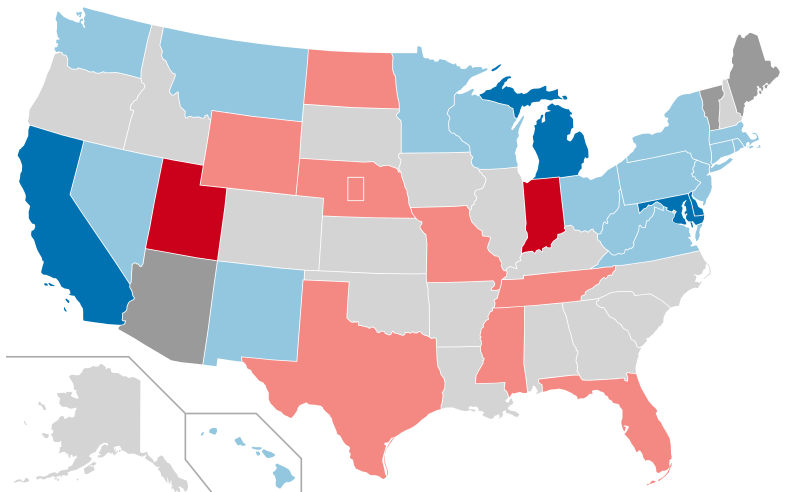
If a Republican wins a US Senate seat in a state Joe Biden won in 2020, this market resolves "Yes".
This market is for the 2024 US Senate elections and US Senate special elections from now through 2024 as long as the term goes beyond Feb 2025 otherwise its November 2024 general election result will be used. For an independent/ third party to be considered a Republican they must commit to caucus with Republicans in the senate through election day.
Runoffs for an eligible election are exempt from any deadlines listed above.
🏅 Top traders
| # | Trader | Total profit |
|---|---|---|
| 1 | Ṁ67 | |
| 2 | Ṁ45 | |
| 3 | Ṁ36 | |
| 4 | Ṁ26 | |
| 5 | Ṁ22 |
People are also trading
@SemioticRivalry Yes, but I don't know what the market creator thinks regarding Nebraska's EVs and the special Senate elections set to happen there.
@Lorxus Maine and Nebraska both have “at large” districts for presidential elections which represents how the whole state voted, that is what will be used so Biden and Trump respectively. Market does not say anything about congressional districts so if a Republican wins NE-2 in either the general or special that does not count as a flip
I was curious to game out what I think the probability here is, so let's take a look at the 2024 Senate map from Wikipedia:

The Biden states with Senate races are:
Arizona: There's a chance Sinema could act as a spoiler if she runs and let a Republican win with a plurality, but I have my doubts - still, the state is listed as a toss-up by Sabato's Crystal Ball, which I tend to trust (it's also listed as a toss-up by Cook Political Report, but their senate and gubernatorial predictions are less accurate than Sabato's in my experience.) P(R win) = 40% (higher than the chance of a Republican winning the presidential election in Arizona, IMO, but not by much.)
California: Feinstein is retiring. There's no way in hell a Republican is winning this seat - hell, in the 2018 Senate election, a Republican didn't even make the general election ballot! Theoretically, if the Democratic vote got split badly enough, two Republicans could end up on the ballot, but I think that's vanishingly unlikely. P(R win) = 0.5%.
Connecticut: Murphy is running again, and he's pretty popular in a solidly blue state. P(R win) = 0.1%
Delaware: Carper is retiring, and Rep. Blunt Rochester is a shoo-in for the seat. P(R win) = 0.1%.
Hawaii: Hirono is running for re-election in one of the bluest states in the country. P(R win) = 0%
Maine: Democrat-affiliated independent King is running for re-election, and he's very popular in the state. Sabato has it as "likely D," but others have it as "Safe/Solid." P(R win) = 1%
Maryland: Cardin is retiring. Same situation as California, but without the possibility of Democrats being excluded from the ballot thanks to primary rules. P(R win) = 0%
Massachusetts: Warren is running for re-election. Same situation as Hawaii. P(R win) = 0%
Michigan: Stabenow is retiring in a blue-leaning but still fairly competitive state. Michigan seems to have taken a fairly sharp turn to the left since 2016, and it seems like Trump's victory there was a fluke - but the state's not THAT blue, and Democrats don't have the incumbency advantage here. Sabato et al. have it as "lean D," but I have it as "likely D." P(R win) = 25% (about the same as the chance I'd assign for the presidential in the state.)
Minnesota: Klobuchar is running again. See Michigan, except Minnesota is relatively more blue and has also been moving to the left since 2016. Sabato et al. consider it "safe/solid D." P(R win) = 7.5% (about the same as the chance I'd assign for the presidential in the state.)
Nevada: Rosen is running again. Sabato et al. have it as "lean D" or "tilt D," but I'm not sure I trust Nevada to remain blue, especially if the Republican nominee makes inroads with working-class Latino voters (again.) P(R win) = 45% (about the same as the chance I'd assign for the presidential in the state.)
New Jersey: Menendez may or may not be running for re-election; given his history of scandals and corruption, it may be best if he doesn't run - though I'd consider the state "safe D" regardless. P(R win) = 2%.
New Mexico: Heinrich is running again, and Sabato et. all consider the state "safe/solid D" in the Senate election despite New Mexico's slightly competitive margins in recent elections. P(R win) = 5% (about the same as the chance I'd assign for the presidential in the state.)
New York: Gillibrand is running again. Same situation as Hawaii and Massachusetts. P(R win) = 0%.
Pennsylvania: Casey is running for re-election. While Pennsylvania is historically competitive and voted for Trump in 2016, it tends to lean slightly more blue overall, and currently has two Democratic Senators and a Democratic governor. Sabato has the election as "Likely D," which I think is about right. P(R win) = 25% (a bit lower than the chance I'd assign for the presidential in the state.)
Rhode Island: Whitehouse is running again. Same situation as Connecticut. P(R win) = 0.1%
Vermont: Bernie, if he runs again, is invincible in Vermont (IIRC, he consistently scores near the top of "most popular Senator in their home state" rankings.) If he doesn't, whoever he endorses will win. P (R win) = 0%
Virginia: Kaine is running for re-election. Basically the same situation as New Mexico. P(R win) = 2.5%
Washington: Cantwell is running for re-election. Same situation as California, but with an even smaller chance of two Republicans ending up on the ballot. P(R win) = 0.1%
Wisconsin: Baldwin is running for re-election in (arguably) the most competitive state in the country, and one that might well decide the 2024 election. She's popular and has an incumbency advantage - and there are some signs that the post-2020 culture war messaging from Republicans in: re trans people and abortion is backfiring in the more culturally liberal parts of the Midwest. Sabato et al. have this one as "lean D," and I think that's accurate. P(R win) = 35% (a bit lower than the chance I'd assign for the presidential in the state.)
Note that Jon Tester (maybe screwed), Sherrod Brown (maybe screwed,) and Joe Manchin (almost definitely screwed) are in Trump states, not Biden states.
I've been betting NO under the assumption that the percentage was too high. Let's find out if I should have been doing that or not:
P(R wins a state Biden won in the 2024 Senate elections, according to my own state-by-state probabilities) = 1 - (0.6 x 0.995 x 0.999 x 0.999 x 1 x 0.99 x 1 x 1 x 0.75 x 0.925 x 0.55 x 0.98 x 0.95 x 1 x 0.75 x 0.999 x 1 x 0.975 x 0.999 x 0.65) = 1 - 0.10 = 0.9 = 90%
...and that's why you always do the math, folks. If my assumptions are consistent, I really ought to have been buying YES. Oops!
FWIW, I think I may be overestimating the chances of Republicans winning a Biden state in the Senate election, largely because I may be underestimating Democrats in Nevada and to an extent Minnesota and Wisconsin as well. I'd rather be surprised by Democrats doing well than surprised by them doing poorly (2016 scarred me, as the first election I tried to forecast as an adult...) My analysis also doesn't account for correlation - i.e. if Democrats win Wisconsin, then their chance of winning Michigan and Minnesota should skyrocket, since that means they're doing well in the Upper Midwest, etc. I know that 538 does that with their forecasts, but I don't know how - hopefully taking a bunch of grad-level stats classes will help me figure it out.
Yeah, assuming that the probabilities are independent (and therefore that you can just multiply them out to determine the probability of one of them happening) is a very bad assumption. This is the mistake that infamously led the Princeton model in 2016 to say that Clinton had a >99% chance of winning. Certainly not easy to model an election with dependent probabilities, though
@SemioticRivalry Yeah, I don't think the chance of it is actually 90%. But I also think I definitely shouldn't have been buying NO when the market was at like 55%.